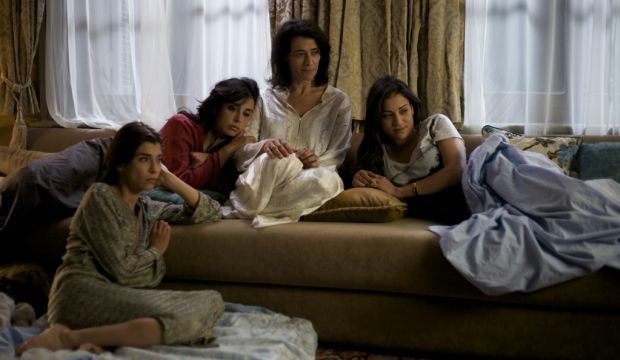Ben Amor is a ghost. His “heart just gave out one day,” he says, before the camera zooms over to a gloomy room in the house where his dead body is being washed according to Moroccan ritual by his reluctant brother and a companion. “I had no time to settle my scores with life. Fortunately, the dead rule over the living,” he says, priming the audience.
The 2013 film, which is set to have its UK premier at ‘Safar: The Festival of Popular Arab Cinema,’ hosted by the Arab British Center in London on September 25, also stars acclaimed Lebanese actress and director Nadine Labaki (Caramel, Where Do We Go Now?). The plot centers around Ben Amor’s traditional three-day funeral and the mourning process of his predominantly female family members—his wife Aicha (Hiam Abbass), his mother Lalla Zaza (Assia Bentria), his three daughters, and the beloved family servant Yacout (Fatima Harandi)—as they congregate at the palatial family home. It is in this stew of grief that deep-seated family tensions and truths begin to unravel.
But the film offers as much comedy as it does turmoil, with the director taking advantage of the comedic skills of her sterling cast by frequently poking fun at the human condition and uncomfortable contradictions in modern Arab society. The female relationships are the most entertaining and dynamic to watch, especially the scenes with the po-faced, cigarette smoking, McDonalds-eating, no-nonsense grandmother, Lalla Zaza, which offer some much-needed light relief.
The youngest daughter Sofia (Morjana Alaoui) returns home for the funeral, after many years’ absence, with her young US-born son in tow. She has been living in America, where she is a successful actress—albeit, we learn, being frequently typecast as a terrorist. She is both mocked and derided by her sisters for abandoning her home and Arab roots and is, in turn, sneering of their life choices. Her troubled relationship with her estranged father is exhibited when the first thing she does upon arrival is race upstairs to where his body is lying in repose and angrily read him a revealing letter from her twin, Laila—whose suicide years earlier is central to the story.
Labaki gives a characteristically engaging performance as Miriam, the beautiful but surly and restless vain sister who is introduced to the audience fresh from her cosmetic breast surgery, bottle of beer in hand. Like her other sister, Kenza (Lubna Azabal) she has chosen the more traditional path of marrying and having children with a man from the Moroccan elite—the chief executive of her father’s company no less—though their relationship seems to be one of indifference towards one another.
Kenza, the eldest sister, a frumpy bespectacled teacher, is the most pious, well-behaved sister of them all, who doted on her father more than she does her husband, something that Lalla Zaza is comically scathing about.
While Ben Amor narrates, with a cheeky wisdom from beyond the grave, his family throw themselves into the first four stages of the grieving process—denial, anger, bargaining, depression—revealing their own secrets, unfulfilled ambitions, insecurities and deep unreleased anger in the process. It is a tumultuous and cathartic exercise that eventually paves the way towards a twist in the film and an unanticipated level of acceptance.
Rock the Casbah looks at Morocco’s social and religious contrasts—illustrated by the stark personality differences of the three sisters, and also by Kenza’s teenage son, who has a face full of piercings and black eyeliner, and aims to become a musical stage performer. “You look like the girl,” the grandmother chides, once again providing an entertaining generational contrast.
But the film also highlights the deep contrasts between the lives of the rich and poor in Moroccan society and differing expectations from both classes. A character in the film that represents this divide is the family maid Yacout, who wears traditional Moroccan Berber clothing and who is told early on by the grieving Aicha that after 30 years in the house her services are no longer needed. It is only later that we meet her brooding son Zakaria (Adel Bencherif) and learn about his taboo relationship with Laila. As the plot unravels further, it is revealed just why Yacout initially accepts this rejection by Aicha, which essentially means destitution, with a simple sadness.
Rock the Casbah’s strong female cast brings to the forefront the many taboos, contradictions and hypocrisies inherent in the clash between traditional Arab and Western influences that still exists for women in Arab society. The issue of a seemingly outdated Islamic inheritance law is also pointedly discussed, wherein a male heir inherits more than a female. If no son exists then the eldest brother takes the lion’s share of the inheritance—in this case a lecherous, weak character with a penchant for young girls, who also has no intention to use the money to support the rest of the family, a condition intended under this law.
There is a visual spirituality to the film that hints at a “Que sera, sera” attitude towards life and death. For instance, transcending the sadness of the villa’s gloomy dark rooms and corridors, light streams through its tall windows, and its white muslin curtains habitually float in the breeze. Ben Amor’s ghost appears before Sofia’s son who, because of his estrangement with her, he never met in life. These are bittersweet scenes, sometimes humorous, that are also a comforting reminder of the circuitous nature of life.
Rock the Casbah will make you laugh and cry in equal measure, though the neatly tied-up ending may have cheapened the experience a little. Equally, the twist in the tale, that wasn’t entirely necessary, though quite predictable, detracts a little from an otherwise engaging, humorous and meaningful screenplay that shows the complicated, fraught and sometimes hilarious dynamics between families.
Safar: The Festival of Popular Arab Cinema runs between September 19–25, 2014 at the ICA in London. Rock the Casbah will be screening at the closing gala on September 25.

